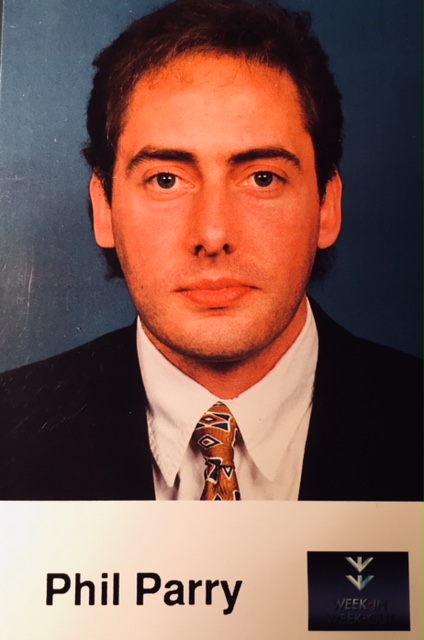- History man - 3rd March 2026
- British Broadcasting Complaint (BBC) - 3rd March 2026
- Rocket man - 2nd March 2026

Here our Editor Phil Parry, who started his 38-year journalistic career in local newspapers, stresses once more the importance of this kind of news, and bemoans the latest circulation figures showing readership numbers plunging further downwards.
Earlier he has described how he was helped to break into the South Wales Echo office car when he was a cub reporter, recalled his early career as a journalist, the importance of experience in the job, and making clear that the ‘calls’ to emergency services as well as court cases are central to any media operation.

He has also explored how poorly paid most journalism is when trainee reporters had to live in squalid flats, the vital role of expenses, and about one of his most important stories on the now-scrapped 53 year-old BBC Cymru Wales TV Current Affairs series he presented for 10 years, Week In Week Out (WIWO), which won an award even after it was axed, long after his career really took off.
Phil has explained too how crucial it is actually to speak to people, the virtue of speed as well as accuracy, why knowledge of ‘history’ is vital, how certain material was removed from TV Current Affairs programmes when secret cameras had to be used, and some of those he has interviewed.

He has also disclosed why investigative journalism is needed now more than ever although others have different opinions, and how information from trusted sources is crucial at this time.
The importance of local journalism cannot be overstated.
Those who might be tempted to break the law, or behave irresponsibly, may be put off doing so by the knowledge that their misdemeanours will be reported in the local rag for all to see.
It also means that good stories are not ignored, and those in the public eye are held to account for their actions.
Yet the latest circulation figures make for sobering reading, and it is especially upsetting for me, as the paper where I started my career in 1983 (the South Wales Echo [SWE]) is doing particularly badly.
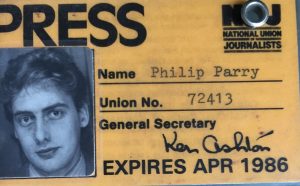 As the UK Press Gazette (the bible for all journalists) puts it: “…every one of the 40 ABC-audited titles have dropped at least 11% of their circulations compared to January to March 2020 before the Covid-19 pandemic hit the UK. The average decline was of 18%”.
As the UK Press Gazette (the bible for all journalists) puts it: “…every one of the 40 ABC-audited titles have dropped at least 11% of their circulations compared to January to March 2020 before the Covid-19 pandemic hit the UK. The average decline was of 18%”.
The SWE (which used to be the biggest-selling paper produced in Wales) is now selling just 8,274 – a drop of 17 per cent on the same period last year.


The Swansea-based newspaper (South Wales Evening Post [SWEP]) is on 10,464, which is also a drop of 17 per cent. The Liverpool Echo readership is 22,069, another decrease of 17 per cent. DC Thomson’s Aberdeen Press & Journal, remains the UK’s top-selling regional newspaper but the circulation is only 31,629.
To put these appalling figures in context, the SWE was selling more than 80,000 when I started on it.
Although all local papers have been severely affected by the rise of internet news, and now the pandemic, even before these latest shocking statistics, it was clear that the SWE was doing something VERY wrong.

The Daily Post (a morning paper which serves North Wales), in 2019 was on 16,327, but regional morning papers traditionally sell LESS than evening newspapers, although most mornings and evenings come out at the same time now!
The lockdown has simply made worse a historic decline for the SWE.
In 1979 it was on 120,000 and 1997 74,246, while even in 2005 the circulation was 57,852. Today it has arrived pitifully at only a few thousand, despite a controversial announcement to axe even more jobs there.

The SWE is owned by the UK’s largest newspaper group, Reach, which also owns the Western Mail among many other titles, as well as the WalesOnline website (all in the Media Wales stable), and last year the company revealed plans to cut 550 staff (or around 12 per cent of its workforce).
A journalist and leading media commentator in Wales said: “The Echo is very close to the point where it’s no longer worth publishing it”.
Meanwhile in an email to staff, Reach Editor-in-Chief Lloyd Embley and group Chief Operating Officer the Editor-in-Chief of Media Wales and Editor of the Western Mail, Alan Edmunds (known as ‘The Jockey’ because of his short stature), “transformation” plans were announced, but that they would have implications for “everyone in our editorial, circulation and printing teams – both regionally and nationally”.
The pair said the heart of this “transformation” was the creation of a “single editorial division, rather than the current nationals and regionals split” with the same for circulation teams.

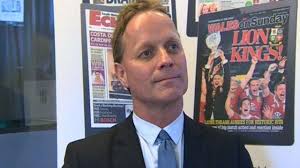
Across editorial and circulation departments on UK publications, staffing numbers have plummeted, with this “transformation”, meaning that roles were potentially put at risk in order to “conduct a fair process”.
The cutbacks were part of changes intended to deliver savings of £35 million a year at a one-off cost of £20 million.

This “transformation” was set against major issues surrounding the lockdown, which have exacerbated huge difficulties already in place for newspapers, and in the usual business-speak, Guardian Media Group (GMG) Chief Executive Officer David Pemsel, has said: “The media sector remains challenging (an understatement!).
In Wales, though, disastrous circulation figures have plunged even further during the lockdown (when it could be argued that people might have turned even more to their local paper for news of what they could, and couldn’t do).
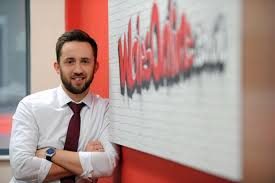
The hit rate for the website WalesOnline, is far greater than the circulation numbers for traditional local newspapers, and this was thought to provide a way forward.
But knowledge of the journalist libel laws among executives here is apparently sketchy, and the one-time ‘Audience and Content Director’ Paul Rowland (who has, naturally, been promoted) threatened to sue me for an accurate satirical piece on The Eye.
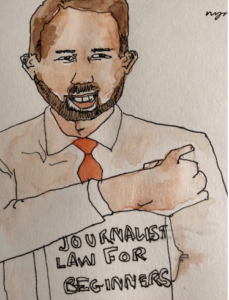 Earlier this year he said on Twitter: “After a fantastic five years, it’s time to hand over the reins as editor of @WalesOnline to @Steffan_Rhys. It’s been a complete joy to grow a title that I’ve been involved with since its inception with the support of one of the absolute best teams in the industry”.
Earlier this year he said on Twitter: “After a fantastic five years, it’s time to hand over the reins as editor of @WalesOnline to @Steffan_Rhys. It’s been a complete joy to grow a title that I’ve been involved with since its inception with the support of one of the absolute best teams in the industry”.
But some aspects of Mr Rowland’s tenure were less than “fantastic”, and it is to be hoped that Mr Rhys’s knowledge of journalist libel laws is better than his predecessor’s, because in December 2016 Mr Rowland warned me: “I am placing it (a satirical piece about the number of ‘news’ ‘stories’ they had written about the opening of a Cardiff bar) in the hands of our lawyers”, and used the extraordinary words “satire is no defence against libel”, when in fact sometimes it can be.
Mr Rowland also has an interesting view on what constitutes journalism.

On his former website, he advised a reader anxious to break into journalism: “You might not be interested in ’19 mouth watering street food dishes and where to find them in Wales’, and you might believe it’s not something we should be writing (I wouldn’t agree, but that’s fine). That doesn’t mean it’s clickbait.”
This sort of intriguing comment about what is and isn’t a story, comes as the circulations of all local newspapers continue to collapse, when the internet is making serious inroads into readerships, and the pandemic is having serious repercussions, but the situation in Wales looks especially bleak.

The Western Mail for example used to be the ‘paper of record’ for Wales and even in 2013 it was selling 22,854 a day. In 2019 it was selling just 10,341, and these most recent figures show that it has dropped further today.
Apart from being once the biggest selling paper produced in Wales, the SWE serves the largest city in Wales (Cardiff) as well as some of its main valleys, so has the most potential market.
When I started on it, there were dozens of journalists at head office in Cardiff, as well as a host of district offices. Four reporters were in the Bridgend office alone!
 Yet now the SWE is a shadow of its former self, and these latest circulation figures show how bad it has become – for everyone.
Yet now the SWE is a shadow of its former self, and these latest circulation figures show how bad it has become – for everyone.
The memories of Phil’s remarkable decades long award-winning career in journalism (including his time as a trainee reporter in local newspapers) as he was gripped by the rare neurological disabling condition, Hereditary Spastic Paraplegia (HSP), have been released in a major book ‘A GOOD STORY’. Order the book now!
Regrettably publication of another book, however, was refused, because it was to have included names.










